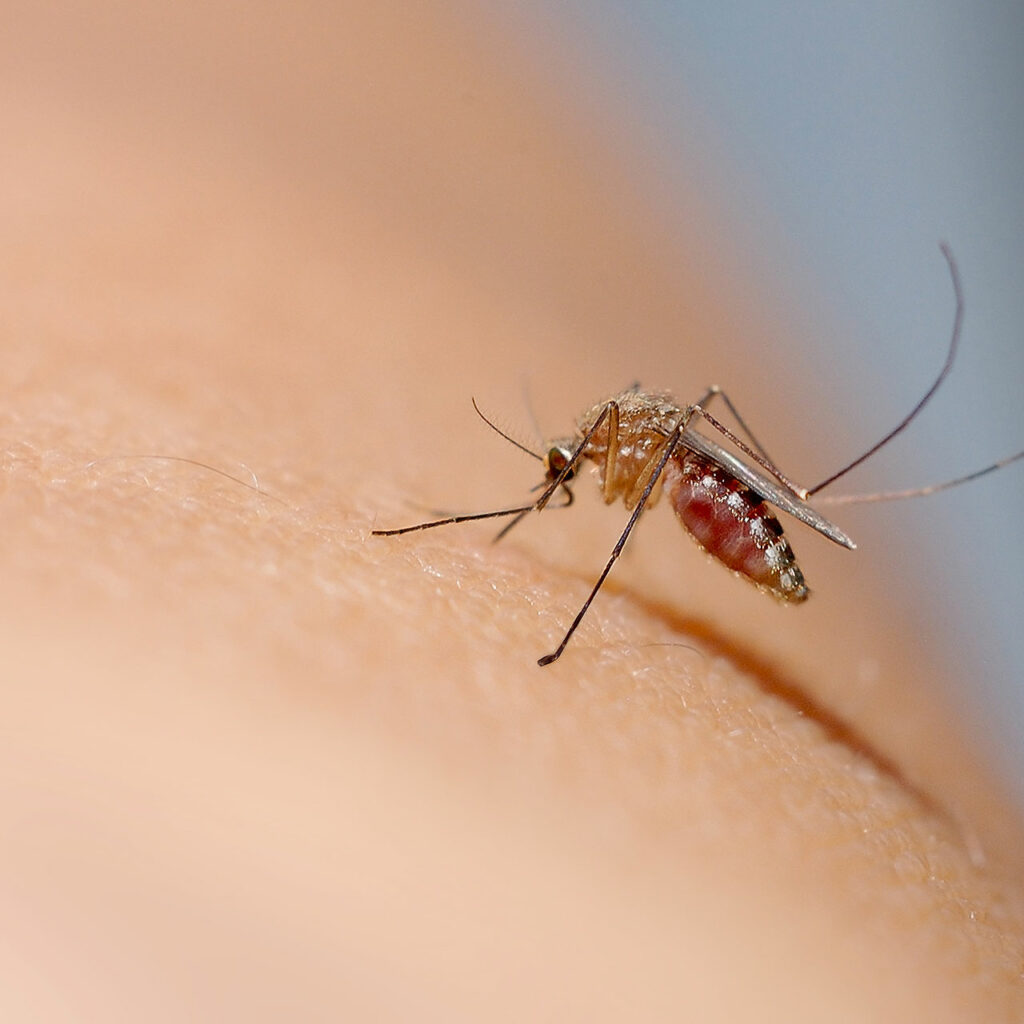
What is Malaria?
Malaria is a life-threatening disease caused by parasites that are transmitted to people through the bites of infected mosquitoes. Malaria symptoms can include high fever, shaking chills, headaches, nausea, diarrhea, fatigue, and vomiting. If not treated promptly, malaria can lead to severe illness and death. Many symptoms may begin a few weeks after being bitten by an infected mosquito, but some parasites can also lay dormant for up to a year before active infections.
How is Malaria transmitted?
Malaria is transmitted through the bites of infected mosquitoes. The mosquitoes become infected when they bite people who have malaria parasites in their blood.
When an infected mosquito bites a person, the parasites are injected into the person’s bloodstream where they travel to the liver and begin to multiply. After several weeks, the parasites leave the liver and re-enter the bloodstream where they infect red blood cells. The cycle of infection then begins again. Once the parasite is in the bloodstream, an uninfected mosquito can bite the person and then spread malaria to other individuals.
How can I protect against Malaria?
The best way to protect against malaria is to prevent mosquito bites. You can do this by using insect repellent, wearing long-sleeves and pants, sleeping under a mosquito net, and staying in well-screened or air-conditioned rooms.
Malaria prophylaxis (or prevention) is also very important for travelers going to areas where there is a risk of contracting this disease. There are several different anti-malarial medications available, including Chloroquine, Mefloquine, Malarone, and Doxycycline. The best medication for you will depend on a number of factors, such as where you are traveling and whether you have any medical conditions that may preclude the use of certain medications.
Your health care provider can help you decide which anti-malarial is right for you and provide more information on how to take it properly to minimize the risk of side effects. It may be important to start taking the medication before your trip, continue taking it for the entire length of time that you are in a malaria-risk area, and take it for a short period after your trip ends.

Can Malaria result in serious illness or complications?
Malaria can cause severe illness and even death if not treated promptly. Malaria can also lead to serious complications such as brain damage or kidney failure. In some cases, hospitalization may be necessary to provide supportive care such as fluids, oxygen, or medications to treat complications. In severe cases, blood transfusions or dialysis may also be necessary.
Over 500 Canadians are diagnosed with this disease every year, and most of these individuals have recently traveled to a destination with Malaria transmission. Globally, over 200 million infections take place annually, with over 400,000 deaths. Malaria is one of the deadliest diseases in the world, throughout history.
Who is at risk from Malaria?
Malaria is a serious and sometimes fatal disease and anyone traveling to a region with malaria should consider anti-malarial medication. Malaria is especially dangerous for pregnant women, young children and those with weakened immune systems. Pregnant women are at risk for miscarriage, stillbirth, low birth weight, and premature delivery. Malaria in young children can cause severe illness and even death.
- Everyone should consider overall length of stay, seasonal risk, and access to medical facilities
- Those visiting rural or remote areas, or traveling during or after rainy season are at high risk
- Individuals who expect to be outdoors between sunset and sunrise are at higher risk
- Individuals who are visiting friends and family from a country of origin are not immune and are at risk for malaria because they may not take precautions in a familiar place which feels safe.
- Expatriates generally have access to medical care, however up to 30% of expatriates develop malaria within 2 years.
- Backpackers are higher risk, as they often have less experience with overseas travel and lack control on their environment, which is constantly changing as they move through destinations.
Malaria prophylaxis is the best prevention against Malaria!
How long before travel should I get medications for Malaria?
Malaria prophylaxis recommendations vary depending on your age, health, occupation, travel plans, and other factors. Talk to your health care provider or a Swift Clinics specialist about when you should get and start malaria medication before your trip begins.
What types of medications are available for Malaria?
Anti-malarial medications can be used to prevent or reduce the severity of malaria infections. There are several different types of malaria medications available, and more are under development. Your healthcare provider, or a Swift Clinics specialist can help you determine which malaria medication is right for you and your trip.
Protection from anti-malarial medications is temporary. Some treatments require continuation post-return, and any travellers who do not take the full dosage regimen are at increased risk of malaria.
Why is it important to get Malaria prophylaxis?
Travelers to malaria-risk areas are at increased risk for this disease. While the best way to prevent malaria is to avoid being bitten by mosquitoes, anti-malarial medication is a very important tool in the fight against this disease. Malaria medications can be used to prevent or reduce the severity of malaria infections. There are several different types of malaria medications available, and more are under development.
Malaria medications recommendations vary depending on your age, health, occupation, travel plans, and other factors. Talk to your health care provider about whether you should get a malaria medications before your next trip.
When should I get Hepatitis A medications?
Ideally, you should get hepatitis A medications at least two weeks before you travel to an area where the virus is common. This will give the medications time to start working. If you are already in an area where hepatitis A is common or about to travel, you should get vaccinated as soon as possible. Vaccination is also recommended for people who are at increased risk for hepatitis A, such as those with chronic liver disease or those who have had a liver transplant.
Talk to your healthcare provider about which medications is right for you and make sure you are up-to-date on all your vaccinations before you travel.

Which countries and regions present a higher risk of Malaria transmission?
Malaria is most commonly found in Africa, South America, Central America, Asia, and Oceania. However, it can occur in any area where there is a risk of mosquito bites. Areas of higher death rate-causing malaria, such as plasmodium falciparum are highest risk:
- Caribbean: Haiti, parts of Mexico and Dominican Republic have moderate risk
- Middle East: limited areas have risk
- South Asia: India, Pakistan and Bangladesh have medium risk
- East Asia: some areas have low risk
- Eastern Europe: limited areas have low risk
- South and Central America: some areas have medium risk
- Africa: West and sub-Sharan Africa is highest risk, as well as limited areas in North Africa
- Oceania: some small islands including Papua New Guinea are highest risk
If you are travelling to any of these areas, it is important to talk to your health care provider about remaining protected against Malaria. There are several options available for Malaria through Swift Clinics, depending on your risk and medical history.
You can schedule your appointment online now by clicking here, or call us at our toll-free number.
Disclaimer : This general information is not intended to replace the advice of a medical professional. If you have any questions or concerns, please talk to your healthcare provider.